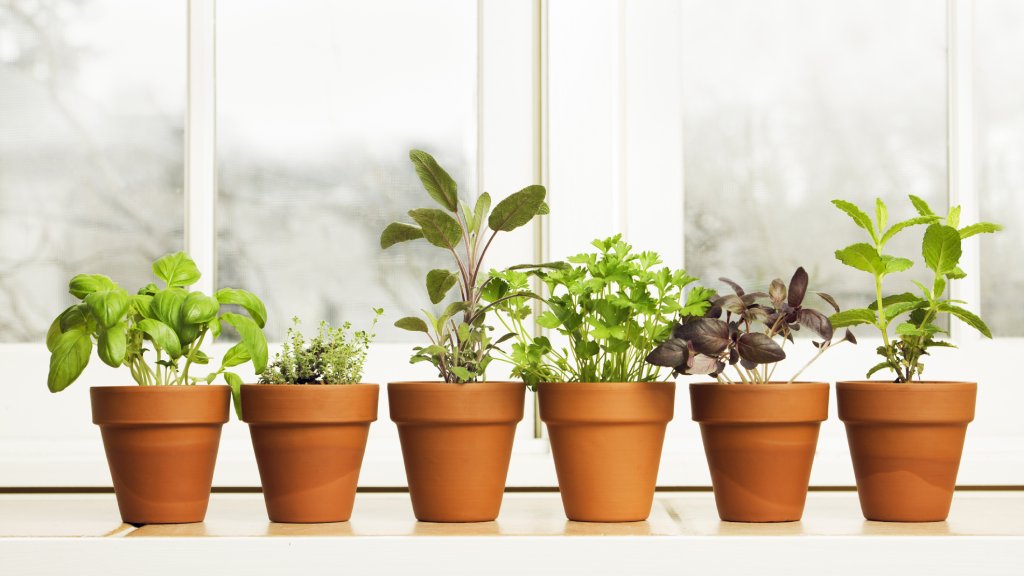Indoor Herb Gardening: Learn About The Pros And Cons Of Indoor Herb Gardens


Sign up for the Gardening Know How newsletter today and receive a free copy of our e-book "How to Grow Delicious Tomatoes".
You are now subscribed
Your newsletter sign-up was successful
Herbs are great, and many of these plants can be easily grown in the home, or so they say. Get the facts here on both the benefits and disadvantages to growing herbs indoors.
Pros - Reasons to Have an Indoor Herb Garden
(Shelley's viewpoint) In my opinion, there's nothing better than having your own "homegrown" herbs in the kitchen. These reliable plants are always there when you need them, but that's not all. Here are some other reasons to have an indoor herb garden.
Herbs year round. An indoor herb garden gives the gardeners afflicted with winter malaise an opportunity to lovingly tend to more plants and enjoy herbs year round after the outdoor growing season has ended.
Low maintenance. Many herbs are relatively low maintenance to grow, all it takes is being mindful of the minimal watering and lighting requirements for each. Some really easy-to-grow options include lemongrass, chives, mint, and parsley.
Save money. One of the best benefits of growing herbs indoors is the cost savings. You can grow your own herbs for the fraction of the cost you spend on them at the supermarket or farmer's market. The cost of fresh basil, for example, can be $2-3 (possibly more depending where you are located) for a few ounces. The cost of a packet of basil seeds is only a dollar or two and, if you nurture your plants, will yield you a bounty of fresh herbs on a weekly basis for a very long time.
They're truly fresh. When you snip off herbs in your indoor herb garden, you know they are the freshest they can possibly be. How long do you think the herbs at your grocery store have been sitting there? The answer is 'a while.'
They're a healthy option. It is possible to boost the flavor of your everyday meals without adding fat, sodium or sugar. Fresh herbs are a great low-calorie and delicious way to add zest and flair to your cuisine, making this one of the most compelling indoor herb gardening pros. When you cook with fresh herbs, your dishes will never be bland or boring.
Sign up for the Gardening Know How newsletter today and receive a free copy of our e-book "How to Grow Delicious Tomatoes".
They're pleasing to the senses.: Herbs are edible but are also ornamental and will definitely add an element of interest to your existing décor with their various foliage colors and shapes. And, in some cases, there are aromatic herbs whose foliage gives off a nice fragrance.
Cons - Disadvantages to Growing Herbs Indoors
(Nikki's viewpoint) I certainly have nothing against herb plants. In fact, I grow many of them in my garden. But growing herbs indoors is something altogether different. Outside of the garden proper, indoor herb gardening problems abound - at least for me anyway and probably many others feel the same. These are my top cons of indoor herb gardens.
Herbs require lots of light. Most all herb plants require at least 6-8 hours of sunlight to thrive. While outside this isn't normally an issue, indoors is quite another story. The average home may not have sufficient light, making the likelihood of your plants' survival hanging in the balance. The best lighting can be found in a south-facing window, but not all homes have this option, which leaves the only other option as supplemental grow lights. Leggy plants is a good sign that those herbs need more sunlight.
Additional lighting can be costly. For those having little light and in need of more, this is simply another added cost to growing herbs in the home. While it may not be a steep expense depending on the type of lighting you get and for how many plants, it's still something to be considered and factored in before considering that indoor herb garden.
Warm temps are important. It's no secret that most herbs like heat. In fact, many are native to warm regions. That said, indoor heat during winter can be quite dry and not exactly the best for thriving herb plants. While you can spend time misting your plants to keep them from drying out or even set them on a water-filled tray of pebbles to improve humidity, this can lead to additional problems if you're not careful.
Watering can be tricky. As you mist your plants to keep their foliage moist and lush, water becomes yet another issue with indoor herb gardening. First, if you have high sodium content or your water is treated with chemicals, this could ultimately be harmful to plants. And as most herbs prefer drier conditions; unfortunately, we tend to kill our plants with kindness, especially in winter. Too much of a good thing really is, as too much water can be detrimental, leading to root rot and the eventual demise of your much beloved plants.
Better double check for bugs. While you're busy watering, you'll have to be on the lookout for pests that may be hiding in the plants, like aphids or spider mites, especially when potted plants are brought indoors from outside. Others may be attracted to the soil, as is the case with fungus gnats.
Given Adequate Care, Indoor Herb Gardening Pros Win in the End
Growing herbs indoors can be immensely satisfying. Being able to grow more plants indoors is great for those gardeners whose green thumbs are twitching during the long, arduous winter months. Cooking with fresh herbs will also make you feel like your most favored famous chef by bringing the wow factor to your meals in a healthy way. And let's not forget the tremendous cost savings of growing your own herbs versus buying from the store.
So, yes, these are all great reasons to have an indoor herb garden. That being said, it's important to make sure you factor in all the possible indoor herb gardening problems BEFOREHAND, which will save you the disappointment of losing your herbs instead of enjoying them. As long as you can provide these plants with what they need, growing herbs indoors is always a good thing.

Nikki Tilley has been gardening for nearly three decades. The former Senior Editor and Archivist of Gardening Know How, Nikki has also authored six gardening books.